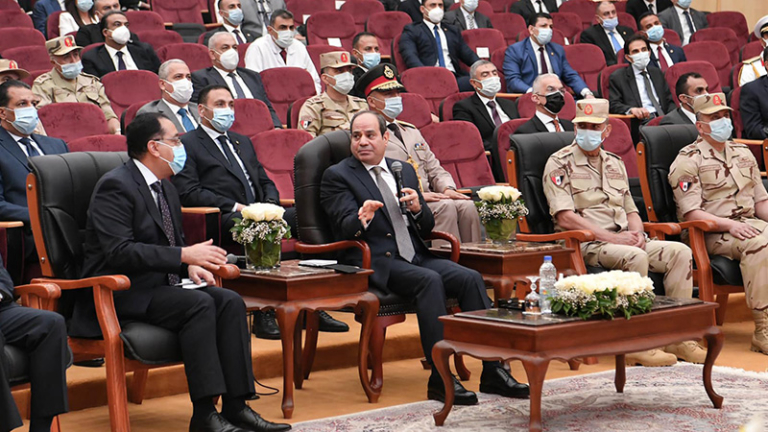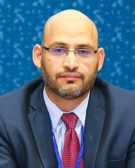
On April 26, Egyptian President Abdel-Fattah el-Sisi called for a national dialogue that he claimed would include all of the country’s political forces, without exception or discrimination. Sisi’s call—the first he has made since the 2013 military coup that brought him to power—immediately spurred a great deal of speculation on social media and among political observers. While some political forces and figures welcomed the call, others remained skeptical that it would lead to any real change or make a breakthrough in Egypt’s current political standstill. In fact, questions remain about the timing and motives of the call, and about whether it is a genuine move or a political tactic to mitigate increasing economic and social pressures facing the Egyptian regime.
A Sudden Change?
Since his ascendance to the presidency in 2014, Sisi has stifled all political opposition, brutally repressed potential leaders, and jailed any individuals who criticize his regime or oppose its policies. He firmly believes that political opposition is a threat to Egypt’s national security and undermines the state’s ability to govern. Hence, it is his national duty to keep them under control. Over the past eight years, the security establishment and intelligence apparatus have been controlling the entire political scene, from engineering a fully submissive parliament to overseeing and directing public and private media outlets and intervening in the internal affairs of political parties.
Sisi is wary that any political opening or freedom of expression, however limited, could undermine his rule and result in his removal from power.
Sisi is convinced that his heavy-handed policies are necessary for maintaining stability and security in Egypt, even if it means throwing thousands of politicians, activists, journalists, and human rights advocates in prison. For the past eight years, he has publicly disparaged the opposition, marginalized its leaders—including those who supported the coup in 2013—and curtailed their political activities. Sisi is wary that any political opening or freedom of expression, however limited, could undermine his rule and result in his removal from power, as happened to former Egyptian President Hosni Mubarak in 2011. He even succeeded in amending the constitution in 2019 in order to remain in power until 2030, ending any possibility for political change in the foreseeable future. The question of why he has called for a national dialogue after all these years of political closure and repression is therefore paramount, and raises further questions about its objectives.
Why Now?
Several factors help shed light on Sisi’s call for a national dialogue. First and foremost are the severe economic and social crises the Sisi regime is facing, which are partially due to the ongoing Russian war on Ukraine and its serious impacts on the Egyptian economy. Since the beginning of 2022, Egypt has suffered from high inflation, significant increases in internal and external debt, a decrease in foreign direct investments, and an outflow of billions of dollars following the devaluation of the Egyptian pound in March 2022. The war in Ukraine further exacerbated economic conditions in Egypt since the country is a key importer of Russian and Ukrainian wheat and cooking oil. These problems prompted Sisi to call for a political dialogue in order to counter mounting resentment and to avoid any resulting social or political unrest.
Another important factor is the immense international pressure the Sisi regime has been under because of its gruesome violations of human rights. The Biden Administration has been pressing Egypt to improve its human rights record, and the State Department recently called for a “transparent and credible investigation” into the suspicious death of economic researcher Ayman Hadhoud, who died in the custody of Egyptian security forces in March 2022. By calling for a national dialogue with the political opposition, Sisi is attempting to respond to foreign pressure by presenting himself and his regime as tolerant and welcoming of political challenges—even though this could not be farther from the truth.
Opening up the country’s political space and making a show of including some opposition figures may be seen by international donors as a sign of political change.
In addition, Egypt is currently seeking yet another financial support package from the International Monetary Fund, and negotiations for a new loan are underway. Opening up the country’s political space and making a show of including some opposition figures may be seen by international donors as a sign of political change, and could strengthen the Egyptian government’s position in negotiations.
Finally, there is some speculation, particularly among opposition leaders, that Sisi is seeking to make additional changes to the constitution that would allow him to remain in power indefinitely. Under the current constitution, Sisi can only remain in power until 2030. But it is possible that he hopes that by engaging the opposition he can further amend the constitution to remove any limits to his time in office, and to use the opposition to support and legitimize these changes.
Mixed Responses
Responses to Sisi’s call for national dialogue from the political opposition and other figures have been mixed. While some political parties and groups responded positively and welcomed Sisi’s call for dialogue, others remain skeptical and have expressed doubts about Sisi’s intentions and the prospects that the dialogue will lead to real change. Some went even further, setting conditions that they want the regime to meet before they participate in the dialogue. For example, a coalition of leftist and secular parties under the umbrella of the Civil Democratic Movement announced that it welcomes the call for national dialogue and plans to participate. But the movement also demanded the release of political prisoners who have been in pretrial detention for years, emphasizing that the dialogue must not replace the release of people of conscience. Surprisingly, some political figures who are known to be supporters of Sisi’s regime criticized the way the dialogue has been arranged, while still welcoming the call for national dialogue. For example, former member of parliament and current Chair of the Reform and Development Party Mohammed Anwar al-Sadat has angrily criticized the way the dialogue has been handled and organized. He even went so far as to accuse security forces of controlling and overseeing the dialogue, announcing that he and his party have been banned from participating in it, a fact that contradicts Sisi’s claims regarding inclusivity.
Similarly, former member of parliament and Chair of the Dignity Party Ahmed Tantawi has expressed skepticism at Sisi’s call for dialogue. In an interview with independent news outlet Mada Masr, Tantawi stressed the need to have a “real dialogue on equal footing.” He emphasized that any serious dialogue should include five areas to be handled by five different committees: political reform and democratic transition, economic reform and social justice, legislative and institutional reform, human rights and public freedoms, and national security. Furthermore, Tantawi criticized Sisi’s economic policies of the past eight years, urged Sisi to step down, and called for new presidential elections. Because of this, he, along with others, was banned from appearing on state and private media.
While the Muslim Brotherhood didn’t overtly reject Sisi’s call for dialogue, its leaders expressed conflicting positions.
The Muslim Brotherhood’s response to Sisi’s call for national dialogue, meanwhile, was reticent and unclear. While the movement didn’t overtly reject Sisi’s call for dialogue, its leaders expressed conflicting positions. For example, one faction of the Brotherhood—the Change Movement—issued a statement calling for several steps to be taken before any dialogue takes place, such as releasing political prisoners of all backgrounds, halting death sentences and executions, and opening up the political sphere. Some leaders, however, adopted more conciliatory language, calling for the start of a new chapter with the regime. Youssef Nada, a prominent Brotherhood leader who lives in Switzerland, said in a statement that was posted on the Brotherhood’s official website a few days after the call that the group is ready to start anew with the Egyptian government after “repaying the injustices” of the past. However, Mohamed Soudan, a senior Brotherhood leader based in London, ruled out the possibility of dialogue between the organization and Sisi. He stressed that the Brotherhood leadership will not accept any dialogue before all of the group’s imprisoned members are released.
In fact, Sisi himself announced that the Brotherhood will be excluded from the national dialogue, which further contradicts his claim that the dialogue will be inclusive. In addition, General Coordinator of the National Dialogue Diaa Rashwan announced that the Brotherhood will be excluded because it is a “terrorist group.” According to Rashwan, “The dialogue is open for all except those who have blood on their hands, topped by the terrorist Muslim Brotherhood group, rejecters of Egypt’s 2014 constitution.”
A Real Change or Just a Mirage?
Sisi’s call for a national dialogue could break through Egypt’s political stasis. However, there are several reasons to believe otherwise. First, thousands of politicians, activists, and journalists are still in prison, with no prospect of being released in the foreseeable future. True, Sisi’s regime released a number of political prisoners in April and June of 2022, but several prominent political figures and activists are still facing appalling and inhumane treatment behind bars, including the liberal activist Alaa Abd el-Fattah who has been on a hunger strike for more than 100 days. Moreover, since the beginning of July, three political prisoners have died in custody, and according to Geneva-based human rights advocacy group Committee for Justice, their death was due to deteriorating conditions inside detention centers. Even while Sisi was announcing the national dialogue, security forces were still actively arresting activists. For example, on July 3 Egyptian authorities arrested activist Aya Kamal el-Din for the third time. She was initially arrested in 2013 for protesting, and in 2020 for a Facebook post criticizing the government’s handling of the COVID-19 pandemic. Another activist and researcher, Ahmed Samir Santawy, was sentenced to three years in prison on charges of publishing “false news.”
There is also no sign that the Sisi regime will be guaranteeing freedom of the press and expression anytime soon. Several journalists remain behind bars, with some having spent years in prison without a trial, as is the case with Al Jazeera journalists Hisham Abdel Aziz, Bahaa el-Din Ibrahim, Ahmed al-Najdi, and Rabie al-Sheikh. Furthermore, Egyptian authorities still block hundreds of news and media websites, particularly those that are critical of the regime, and they also fully control the country’s public and private media. Not only do efforts to block key political forces like the Muslim Brotherhood from participating cast doubt on the dialogue’s credibility, but the regime is also excluding the many opposition leaders and activists from all walks of political life who have fled the country since Sisi came to power. One such figure is Ayman Nour, a well-known liberal figure and a former presidential candidate who ran against former president Hosni Mubarak in 2005. Nour, who has been living in self-imposed exile in Turkey for the past nine years, was not invited to participate in the national dialogue.
Despite the fact that Sisi’s call for a national dialogue has caused a spark in the political atmosphere in Egypt and created momentum among the Egyptian opposition both at home and abroad, it remains to be seen whether the offer is truly genuine and can actually end Egypt’s protracted political crisis. But when one looks at the realities of authoritarian rule in Egypt today, it is not hard to see the call as anything more than an exercise in political expediency, one that comes as economic and social conditions continue to deteriorate and hopes for improvement are dashed on a daily basis.

